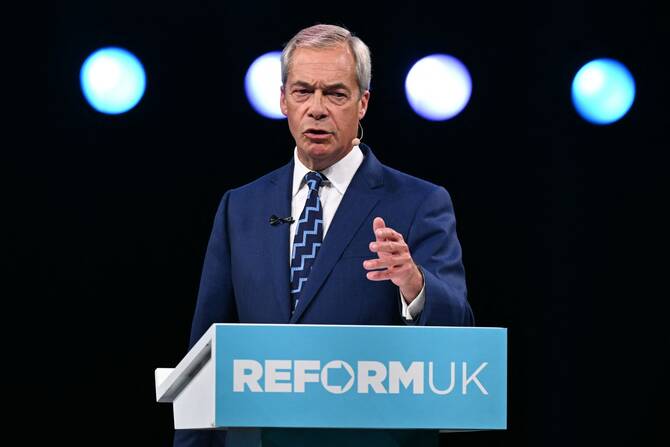Mohamed Chebaro
I believe that alarm bells ought to be ringing in various quarters of Britain, as last week’s Reform UK conference in Birmingham attracted so much attention and in excess of 10,000 attendees — deserved in the minds of some and undeserved in the minds of others — in a divided and polarized not-so-United Kingdom.
In the season of party political conferences, the spotlight is rightly focused on the vocal new kid on the block, Reform UK, led by the colorful friend of Donald Trump, broadcaster-politician Nigel Farage. He has flooded the country with simple anti-immigration policies, stories of the failure of diversity, and the supposedly endless failings of the country’s two main political parties. All that while using the mantra of patriotism as well-rehearsed cover for prejudice and racism.
The questions on everybody’s minds are whether it is an electable party and whether its meteoric rise in the polls is stoppable.
I am not one for scaremongering but the Labour government of Prime Minister Keir Starmer, after just over a year in power, ought to watch out, as the rightward shift of UK politics has been relentless since 2010. And it is not likely to subside any time soon.
As if that were not enough, the pull from the US — in the sense of empty patriotic slogans dressed up as taking back control against an “invasion” of foreigners — is also significant. Meanwhile, the media, which in the name of being balanced and impartial, has been acting as a megaphone for bigotry. Add that to the unpoliced digital realm and the scene appears set for the kind of seismic shift that, until recently, many believed the UK parliamentary system was unlikely to allow. In my opinion, the gates that have long shielded the UK have been destroyed and the guardrails, whether institutional or those of civil society, have weakened, if not fizzled out entirely.
Trumpism had been taking root in the UK well before the Reform party was founded in 2018. Its version of patriotic nationalism mixed with populism, with a bit of the far right on the margins, was among the forces that orchestrated the UK’s exit from the EU. The Brexit campaign’s slogans of taking back control and securing the borders preceded those of “Make America Great Again” — or maybe they were even a test run for the use of extreme narratives and the mobilization of dormant grievances, channeling them with the help of biased algorithms and data to manufacture dissent, amplify it and then mobilize the people to vote for marginal figures.
What is not certain is whether the resilience of the UK’s political system will survive. The same figures that made up the far right of the Conservative Party are marching again, this time under the banner of Reform. One would hope that the UK’s political system will be able to avert a total shift to the right, but it could be possible if the Labour government continues its slow grind toward the right, as it adopts Reform’s narratives on policing, law and order, and immigration.
The level of attendance at the Reform party conference by business and industry leaders was alarming, as many of them hope to capitalize on its popularity and avoid being left out. The ultra-right is toxic, but it seems popular and maybe even electable in Britain.
It is clear that Reform is a small party with a tiny number of elected representatives in Parliament. It lacks a meaningful policy platform and a worldview that is not based on conspiracy theory, but it also increasingly seems on course to lead the next British government.
Reform’s appeal is no different to the advances made by far-right parties across Europe and the US. The baffling speed of its rise is no doubt due to the Brexit era, which divided society and eroded belief in the system. So, the voters have ripened and picking them is now easier.
Reform won 14 percent of the vote in the 2024 general election but gained only five MPs due to the British electoral system favoring the larger parties. Since then, its membership has tripled to more than 240,000 and it seized control of 12 local authorities across England in May. It has been leading in all national polls over recent months.
Until recently, I believed the Starmer government ought to be given the chance to govern before being judged, but — 14 months after it came to power — it is looking increasingly wishy-washy, treading ever more carefully and sometimes even enabling the rise of the ultra-right. Britain is at a crossroads, maybe facing the gravest moment in its peacetime history. The question is whether Starmer’s presence at the top is aiding or hindering the march of the ultra-right populists toward taking control in the UK.
Starmer’s statesmanship is clearly old-school and at odds with the performative leadership style that many UK voters seem to find appealing in Farage. Starmer and his government ought to work hard to show that true patriotism and leadership require grinding everyday work and are more complex than simply demonizing refugees or wearing Union Jack socks.
Courtesy: arabnews







